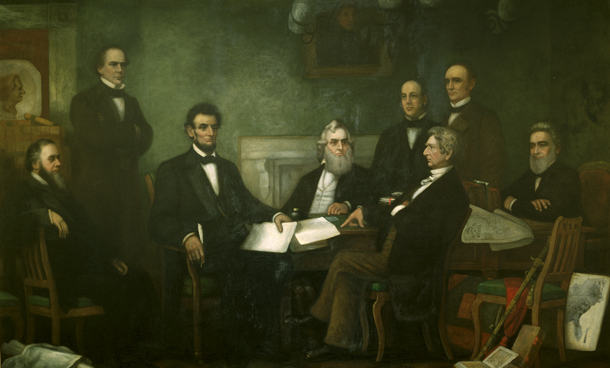
From The UK Guardian, "The Emancipation Proclamation at 150: Abraham Lincoln's turning-point; The preliminary proclamation freed no slaves, but it irrevocably changed the Union's grounds for war against the Confederacy," by Eric Foner, on 17 September 2012 -- One hundred and fifty years ago this week occurred one of the crucial turning points of the American civil war and, indeed, of American history. Not on the battlefield, although at Antietam on 17 September 1862, a Union army forced Confederates under Robert E Lee to abandon their invasion of Maryland. Rather, it came five days later, when Abraham Lincoln issued "A Proclamation" warning the south that if the war did not end within 100 days, he would declare slaves in areas under rebellion "forever free".
Like all great historical transformations, emancipation during the civil war was a process, not a single event. It played out over time, arose from many causes and was the work of many individuals. It began at the war's outset when slaves, ignoring Lincoln's insistence that the struggle was about national unity, not slavery, began to seek refuge behind Union lines. It did not end until December 1865, when secretary of state William H Seward announced the ratification of the 13th amendment, irrevocably abolishing slavery throughout the reunited nation. But what came to be known as the Preliminary Emancipation Proclamation marked a key step in this process.
Lincoln believed that union, not emancipation, was the lowest common denominator of public support for the war. But he also understood that slavery was the war's fundamental cause. Beginning in November 1861, he promoted a plan to encourage voluntary abolition in Delaware, Maryland, Kentucky and Missouri, the border slave states that remained with the union. The federal government would provide financial compensation to states that acted to end slavery, and would encourage the freed people to emigrate to Africa or Central America. (Lincoln had long believed that "colonization", as this idea was called, would benefit both races; most blacks denounced it as a denial of their right to equality in the United States.)
On 22 July 1862, Lincoln informed his cabinet of a dramatic change in policy. He had decided to issue an order freeing all slaves in Confederate-held areas as of the following 1 January. During the previous months, he had been subjected to enormous pressure to adopt a new course. The Republican majority in Congress had pressed forward with actions against slavery – barring the army from returning fugitives, abolishing slavery in Washington, DC and, in the Second Confiscation Act, freeing slaves held by Confederates if they came within Union lines.

Lincoln signed all of these measures. With the war at a stalemate, he was increasingly convinced that the Union could not emerge victorious without making slavery a target. He was also exasperated with southerners, including the border states, who professed loyalty to the Union but insisted that slavery remain undisturbed. When a prominent citizen of New Orleans complained that the army was encouraging slaves to escape, Lincoln fired back:
"What would you do in my position? … Would you give up the contest, leaving any available means unapplied?"
Not all cabinet members approved of Lincoln's decision, although all recognized its momentous significance. But Seward warned that issuing the proclamation immediately might seem as an act of desperation – he advised Lincoln to wait until the Union achieved a military victory. Lincoln put the Proclamation aside. During the next two months, he continued to affirm his previous policy regarding slavery, urging a black delegation at the White House to promote colonization among their people, and publishing a widely-noted letter to New York Tribune editor Horace Greeley, reaffirming that preservation of the Union, not abolition, was the war's primary purpose.
Antietam provided the victory for which Lincoln had been waiting, and on 22 September 1862, he issued the Preliminary Emancipation Proclamation. The document revealed Lincoln's thinking at a crucial moment of transition. He reiterated his previous commitment to monetary compensation for slaveholders whose states consented to abolition and his belief that the freed people should be colonized outside the United States. (These elements would be eliminated in the final Emancipation Proclamation.) But he made it clear that after 1 January, the Union army would be fighting not simply to preserve the Union, but to destroy the major institution of southern life.

Lincoln's proclamation was only a warning. It did not free a single slave – that would come when the Emancipation Proclamation was issued. But contemporaries understood that the character of the civil war was about to change. Perhaps the most penetrating assessment came from Karl Marx, then writing occasional dispatches from London for the New York Tribune:
"Up to now, we have witnessed only the first act of the civil war – the constitutional waging of war. The second act, the revolutionary waging of war, is at hand."(source: The UK Guardian)


No comments:
Post a Comment